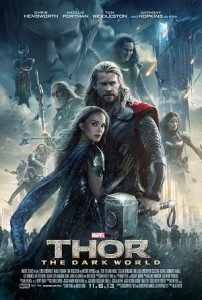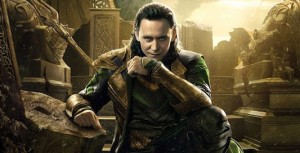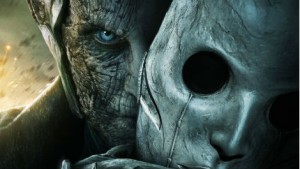Thor: The Dark World
Reviewed by Gavin Burrows 18-Nov-13
Gavin Burrows reviews Thor: The Dark World: It delivers great Thor/Loki moments, but where can the franchise go next? Includes many spoilers.
 I say thee the below has spolierific content!
I say thee the below has spolierific content!
Villains don’t win the day very often in genre films. But that doesn’t stop them winning over the audience. Even when they don’t become the title character (as managed by Dracula and Fu Manchu), they still tend to get ahead in popular affection. It’s not surprising. To the hero falls the role of prefect, there to enforce the school rules. The villain’s the one who effectively suggests you slope off from Maths for a crafty fag. Even their inevitable defeat is a mere ritual observance of the formalities. We fret not, knowing they’ll be back.
Take Tom Hiddleston’s Loki. Loki’s now pulled off a hat trick: first in the original Thor, then even against the assembled might of The Avengers, and now in Thor: The Dark World. But this Thor sequel makes it clear which cylinder is firing. Watching, you imagine Loki is endlessly coming up with pithy putdowns, like his main super-power is snarky wit. But play them back in your mind once the film is over and they’re not so memorable after all. The magic’s in Hiddleston’s performance.
After Peter Bradshaw’s Guardian review commented that a new villain’s arrival “catastrophically… downgrades the status of this franchise’s star performer”, I became concerned this Loki-light installment would disappoint. In fact, the newbie enemy (more of whom anon) doesn’t diminish Loki but forces Thor into a prickly, troublesome alliance with him. As Hiddleston himself pointed out: “I’ve been the bad guy now twice, so I can’t be again, or otherwise I shouldn’t be in the film. So we have to find a new role for me to play.”
Not only does this development avoid repetition, it increases the portion of screen time Thor and Loki share. And it’s in their fraternal friction that the film sparkles most. No wonder a Chinese cinema mistakenly put up a doctored poster of the two, which breached new frontiers in bromance. (Perhaps coining a new term, slashpic?) Someone should engineer a commentary on the DVD release where Hiddleston and Thor’s Chris Hemsworth narrate in character – it would almost certainly be better than the actual film.
 Despite Loki’s predilection for treachery, the movie finds a compelling reason for the team-up, one which mirrors Peter Parker’s origin as Spider-Man so closely that it can’t be coincidence. Loki diffidently fails to tackle an enemy of Asgard, who then goes on to murder his mother.
Despite Loki’s predilection for treachery, the movie finds a compelling reason for the team-up, one which mirrors Peter Parker’s origin as Spider-Man so closely that it can’t be coincidence. Loki diffidently fails to tackle an enemy of Asgard, who then goes on to murder his mother.
His reaction to this is the key plot component, the drive which powers the film. The significance of this is interesting. Loki notably carries a lot of the codes popular culture associates with homosexuality. Unlike Thor, he has no romantic involvements, while being highly associated with his mother. He has her powers of illusion, while Thor’s powers take more after Odin. When she dies he’s notably more distraught than anyone else, sulking in his cell like an emo teen in his bedroom.
The brothers’ plot task is to restore the cosmic balance, a macro-scale version of their shaky alliance. But, significantly, it is Thor who must reorient himself around Loki’s way of working. Their enemies are powered by the Aether, which, representing darkness, cannot simply be smited. (It’s visualised as a bubbling protean force, impervious to the neat straight lines of Thor’s hammer blows.) As Loki comments, “hitting does not solve everything” – what’s now required is cunning and no small amount of subterfuge. In my Avengers review, I described Loki as a shadow, and in his battle against the forces of darkness what Thor needs most is that shadow on side. At this he succeeds. “You lied to me,” Loki tells him at one point. “I’m impressed.”
And if Loki’s the de facto protagonist, Thor is correspondingly given the standard companion task – the eye candy. There are repeated references, verbal and visual, to him being “still all muscly and everything”. Natalie Portman even gets her hand on his pecs in the poster. The use of “still” might be significant in that quote; there seems more of this than previously, most likely the result of focus group findings. And Thor remains innocently impervious to it all, a Monroe blonde throughout.
Lately we’ve see Thor and Wolverine’s muscles repurposed for women’s eyes. For those of us who remember the old boy’s world of superhero comics, this seems quite a shift. But, tellingly, that’s pretty much all the girls get. If this film’s anything to judge by, forty years of feminism have only given them the right to ogle the boys back.
The scenario is effectively stolen from Lord of the Rings. Replacing the Orcs with “Dark Elves” is a throw which will fool no-one. They have to journey to Svartalfheim instead of Mordor, with a fellowship which soon reduces to Thor’s Sam and Loki’s Gollum. But Jane Foster is less Frodo the ring-bearer and more the ring itself. She absorbs the Aether energy by happenstance, blundering into her role as a mere swooning plot token.
When Odin disparagingly compares her to “a goat”, you imagine at one point she’ll win the day and with it the respect of her prospective father-in-law. (When his comments are an almost complete reversal of what he’s previously told Loki, there doesn’t seem much other reason for him to be saying them.) But none of that goes anywhere. As in the earlier film, she’s been promoted from the nurse of the comics and is now an astrophysicist. But even the scientific instruments which get employed in the finale come from Dr Selvig, her continuing mentor despite the seeming disadvantage of his having gone mad. Meanwhile, in Sif’s main scene her role is to intuit what Thor is thinking. Plus ça change…
We’ve come to the Dark Elves last and, yes, they’re the least. They have the same plot function as the Frost Giants of the first film, or the Chitauri of The Avengers – and all three are pretty much interchangeable. There’s some nice stuff about the cyclic nature of reality, making everything a cosmogenic battle between light and darkness set on eternal repeat. And their dagger-shaped ships, literally and metaphorically tearing worlds into strips, are a strong image.
 But mostly they’re there so the heroes have someone to fight. Christopher Eccleston is rather wasted as Malekith, a part which could be done by anyone who could read out lines which don’t contain any vowels. (While the Asgardians seem natural English speakers, the Dark Elves are confined to sinister subtitles.)
But mostly they’re there so the heroes have someone to fight. Christopher Eccleston is rather wasted as Malekith, a part which could be done by anyone who could read out lines which don’t contain any vowels. (While the Asgardians seem natural English speakers, the Dark Elves are confined to sinister subtitles.)
The notion of realities converging gives the final battle a lift, allowing it to criss-cross between them. Characters struck down in one world will fall in another. But it’s just not the same without Loki, who by this point has been killed and departed from the story (weirdly duplicating the way the Joker was struck out before the finale of Dark Knight).
Marvel Universe films have built up a tradition of closing with teasers for the next release. This one has… count ’em… three. (Pre, mid and then after the credits. Even I left before the last one.) In one of these Loki turns out to be – surprise! – only Marvel dead. This suggests, of course, there’ll be a second sequel in which he and Thor are back to being antagonists. Which brings up the downside of Hiddleston’s comment quoted earlier – if they’re just going to fight each other again, what’s the point?
These films have an essentially repetitive structure, inherited from their superhero comic origins. Essentially it’s murky set-up/big enemy attack/Rocky montage scene/big heroic counter-attack. Very few actual surprises occur en route. Like a stage magician, the Thor series has twice misdirected us away from those schematics by foregrounding Thor and Loki’s sibling rivalry. But once that ceases to dazzle, there’s nothing there to underpin it. They either need some new twist (perhaps Loki sitting in his cell for the whole film, making the odd aloof interjection as events fly past him), or, great as his performance is, Hiddleston is right and he shouldn’t be in the film. In which case we need to ask – does that film warrant making? I say thee nay.
Tags: Avengers, Chris Hemsworth, Loki, Marvel, Marvel Cinematic Universe, Thor, Thor: The Dark World
I think you make a lot of good points here (though Jane does get a bit more to do at the end than you imply – yes, the tools are Selvig’s, but it’s Jane who determines how to employ them). Nevertheless, of the eight movies in the franchise, I would argue that only Avengers is better.
Thanks! Promoting Jane from nurse to scientist seemed an ideal means to give her an ‘in’. With Thor being such a brawny character he’d surely welcome a little brains about the place. While, apart from adding some comedy, there doesn’t seem much necessity to have Selvig in the film at all. Why couldn’t the tools just be hers?
But it’s not so much that it’s an unusually diminished role for a female love interest in such a film. It’s actually pretty usual, I’d say. What stuck me was the juxtaposition between that and the decision that there would be female audience members, who would need some man flesh to ogle at.